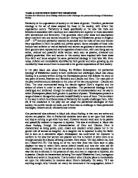“To an Elizabethan audience we can be sure that Faustus’ rebellion would be exhilarating and terrifying in equal measure.” Explore this statement considering the cultural and religious values of Marlowe’s day.
Dr Faustus was written by Christopher Marlowe in the Elizabethan era, which was a time of great religious importance, and high in catholic beliefs. Catholics believed that God was the most powerful entity in the word and the creator of the universe.
Faustus condemned his soul to the devil, in order to become as powerful as God himself. This act is ironic in itself, however to an Elizabethan audience, this act of rebellion would not only be frightening, but in many ways exhilarating. There is no-one in the world, old or young, who would not give everything they have to become as powerful as God, but would not dare rebel against the lord. Faustus committed blasphemy, and was rewarded by Lucifer, showing the people that God can indeed be undermined, and a bounty received. But the receiving would never out-do the giving, as Faustus gained twenty-four years of power for an eternity under the Devil. The people had no other options but to believe, and have a religion of which to hold on to. Although Faustus gained from his deception, the people dare not go against God. Science was little researched, and a secular society was somewhat unheard of. The audience would have been intrigued and excited as to what fortunes he gained, but also terrified, as the outcome would end in Faustus’ soul being owned and controlled by the Devil.







